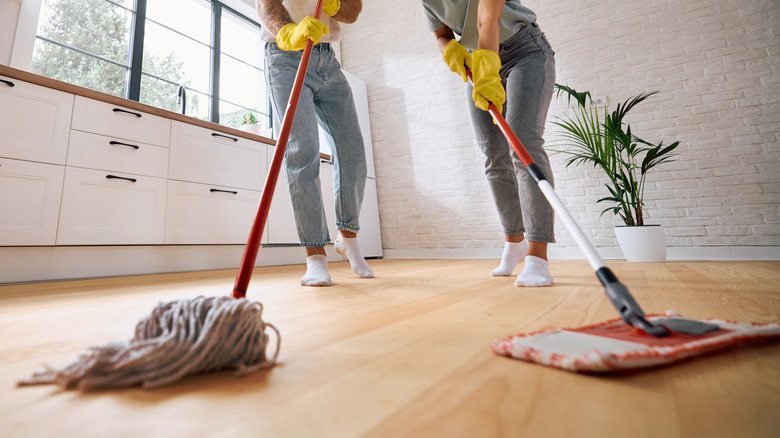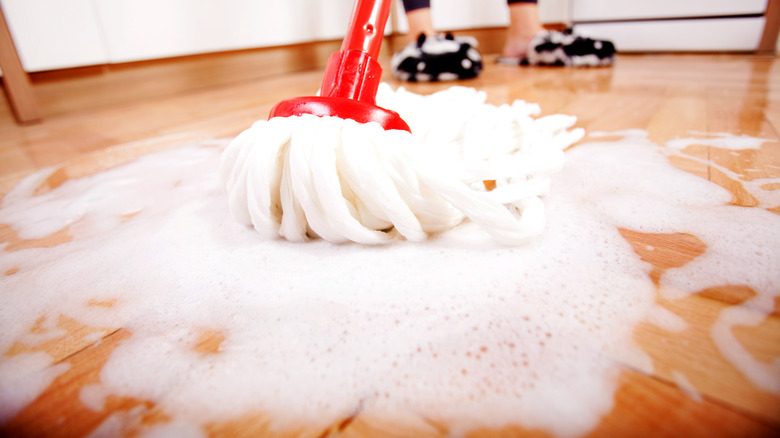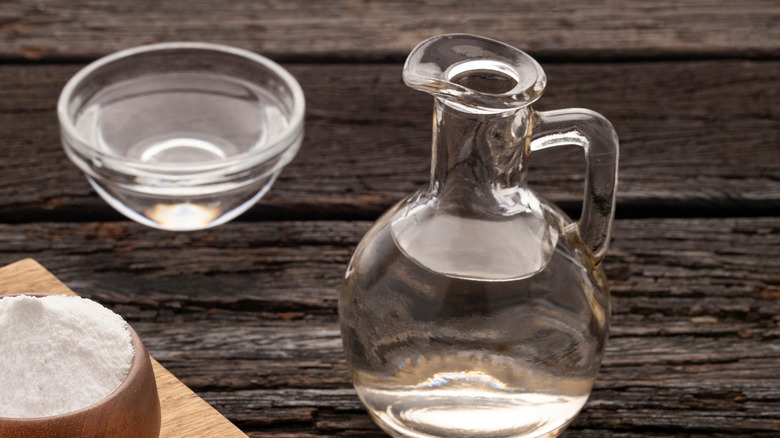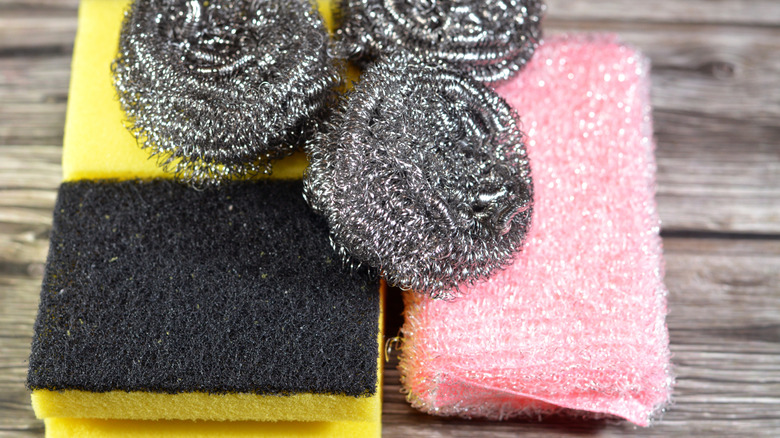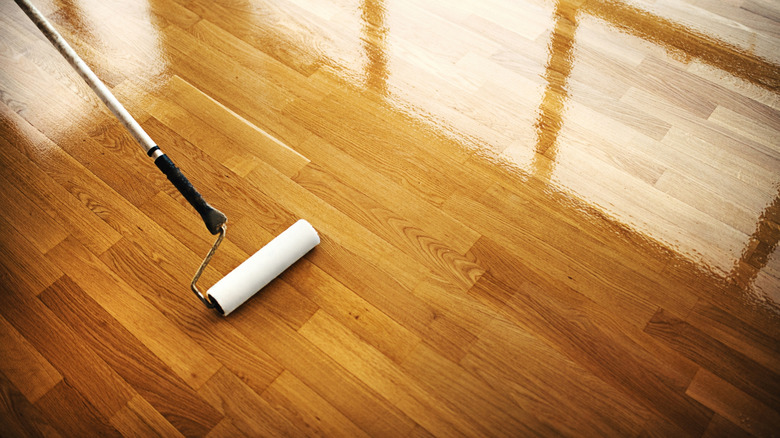Things You Should Never Do When Cleaning Hardwood Floors
Hardwood floors are beautiful, and they have certainly proven their worth over the years. Not only are these floors versatile when it comes to the sheer variety of home designs and architectural styles that they enhance, but they are constructed from environmentally sound material, since wood is a totally renewable material (and it even stores carbon!). There's also the fact that there are so many types of hardwood that floors can be made from, whether it's common domestic types like oak, maple, and hickory, or unique and rarer ones like Brazilian cherry.
There's just one thing all hardwood flooring types have in common: They always need to be taken care of properly. Performing the wrong viral cleaning hack can be disastrous, and even common errors, done repeatedly, can ruin your finish.
Let's go over the cleaning mistakes that you're more likely to be guilty of. Before we do, though, we should clarify that when we're talking about hardwood floors, we mean solid ones, not the manufactured "hardwood floors" that are actually a plywood-like product topped off with a hardwood veneer. The resin-based finishes and adhesives used on this product means that they can be treated totally differently than their solid wood cousin, and thus require different maintenance tips than the ones provided here. The same is true of softwood floors, such as pine, which also require different maintenance from hardwood.
Too much soapy water on your hardwood floors is a mistake: Wood fibers fear the flood
Wood is a hygroscopic material, which means that it will continuously absorb or release water moisture within the fibers that make up the substance of the wood. Wood will naturally expand and contract seasonally, which is normal, and wooden flooring can accommodate that degree of wood movement.
Now, here's the thing. If you mop your hardwood floors using a liberal amount of soap and water, you will indeed clean the floor nicely ... but even if you quickly mop up the excess water, the wood will begin to swell excessively, due to the moisture its fibers have absorbed during the mopping process.
This leads to problems. First, excessive wood movement caused by extreme swelling and then shrinkage will break down the finish applied to the wood. When the wood swells it stretches and causes tiny cracks in the film finish. Those cracks will allow more ambient moisture, causing more wood movement, breaking the finish down further. Those cracks and finish flaws often cause the wood to look cloudy and can even allow the wood under the finish to discolor. Also avoid steam cleaners, as super-hot water in the form of steam will cause the same swelling problem.
Avoid vinegar (and DIY vinegar solutions) on hardwood floors
For good reason, vinegar cleaning hacks are everywhere now. In general, vinegar mixed with other components is exceedingly popular as a cleaner today. It's a safe, non-toxic, organic cleaner that is inexpensive and effective. And it is versatile and useful in so many situations. Sadly, cleaning hardwood floors is not one of them. The vinegar is simply too acidic. The clear finishes that are applied to most hardwood floors will break down over time from the acid content of the vinegar. By far the most common finish, polyurethane, is easily harmed by acidic cleaners.
So, leave your acidic cleaners behind when cleaning hardwood floors. The same for ammonia-based cleaners (often found in window cleaners and other general purpose spray cleaners). Ammonia is even harsher than vinegar – though ammonia is alkaline, rather than acidic — and should never be used on finished hardwood. Always use PH neutral cleaners.
If you have hardwood flooring, avoid using abrasive pads or products
Never use abrasive products on hardwood floors, regardless of the type of finishing product that has been used on them. Over time, the abrasive surface will abrade right through the finish — acting almost like sandpaper, exposing the wood fibers and leaving them unprotected. Look at your mop heads and avoid those with the synthetic abrasive strip when cleaning your hardwood floors.
Do the same with the Swiffer-type cloth pads, adjusting the pad on the cleaning paddle so that the abrasive will not rub against the floor. And while it is imperative that you vacuum your hardwood floor regularly (it is one of the very best ways to protect the finish on your hardwood floor), if you still have a beater bar, then don't use it: It can have the same effect as abrasive pads, degrading the finish over time.
Most importantly, hardwood floor owners should not ignore the difference between poly and wax finishes
Finally, perhaps the biggest mistake people make is assuming that all hardwood floors — and their finishes — are the same. Hardwood floors are popular and ubiquitous because they are beautiful, versatile and durable, but if you don't mind the finish, their longevity won't be so impressive. In that regard, before you buy any cleaner, you should be aware that there are basically two types of hardwood floor finishes that are popular today. By far, the most common is polyurethane — either oil-based or water-based. Poly presents a finish with a notable shine. It creates what is called a film-coat that essentially lays on top of the surface of the wood, sealing and protecting the wood fibers. Polyurethane floor finishes are extremely durable and will last for many years.
The other floor finish that is common today are hard wax oil finishes. As the name implies, they are a mixture of oils and waxes. The oils in this product are absorbed by the wood fibers with the waxes staying more on the surface. Hard wax oils have a lower sheen than poly finishes and need to be refinished more often than polyurethane, but that touch up is super-easy with hard wax oil.
Floors finished with polyurethane should be cleaned with a PH-neutral standard floor cleaning product. Hard wax oil floors should be cleaned with an oil-based cleaning concentrate. Using a standard floor cleaning product will strip away the protective wax layer. On the other hand, using the oil-based concentrate on a poly finished floor will eventually leave it looking cloudy and lowering its sheen. Mind this difference if you want your floors to last.
